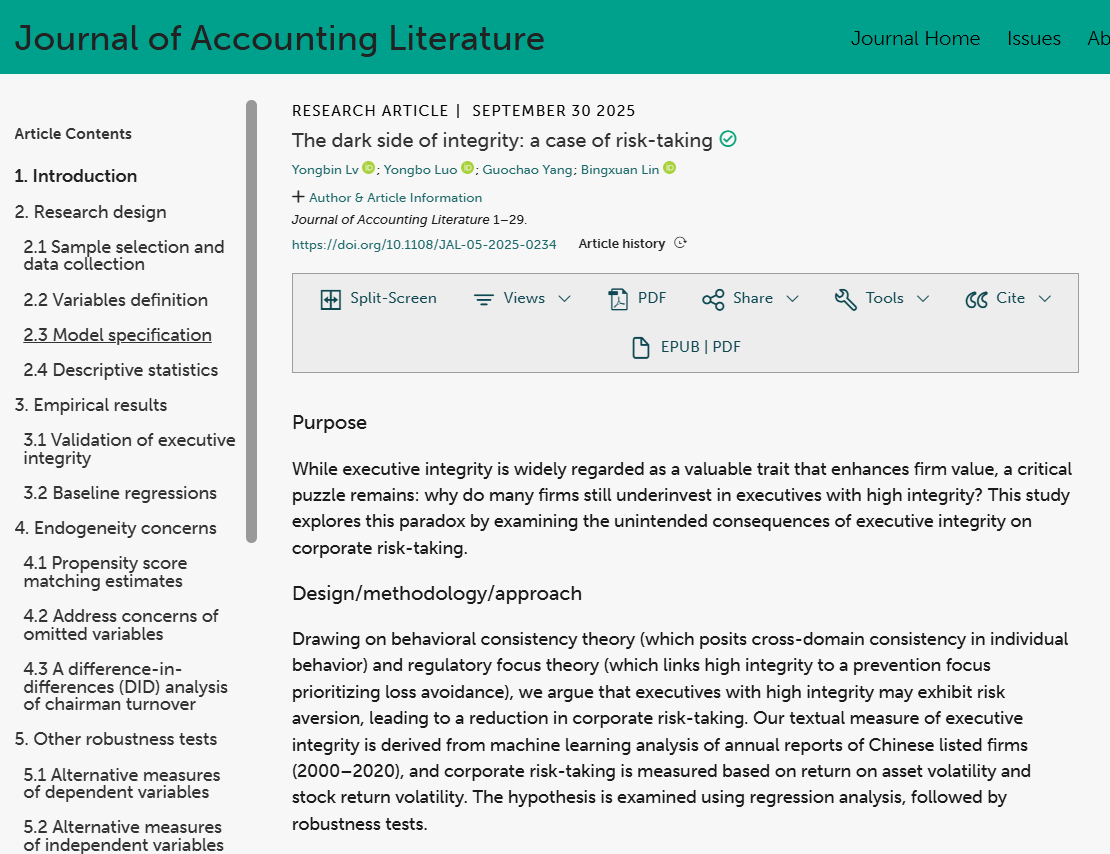Professor Yongbin Lv (first author), deputy director of the base, and researcher Professor Guochao Yang, foreign academic backbone Professor Bingxuan Lin, and Dr. Yongbo Luo (corresponding author) of the School of Finance, Zhongnan University of Economics and Law were published online in the Journal of Accounting Literature. JAL is a three-star journal of ABS and a category B journal recognized by Zhongnan University of Economics and Law.

Purpose
While executive integrity is widely regarded as a valuable trait that enhances firm value, a critical puzzle remains: why do many firms still underinvest in executives with high integrity? This study explores this paradox by examining the unintended consequences of executive integrity on corporate risk-taking.
Design/methodology/approach
Drawing on behavioral consistency theory (which posits cross-domain consistency in individual behavior) and regulatory focus theory (which links high integrity to a prevention focus prioritizing loss avoidance), we argue that executives with high integrity may exhibit risk aversion, leading to a reduction in corporate risk-taking. Our textual measure of executive integrity is derived from machine learning analysis of annual reports of Chinese listed firms (2000–2020), and corporate risk-taking is measured based on return on asset volatility and stock return volatility. The hypothesis is examined using regression analysis, followed by robustness tests.
Findings
We find that firms led by high-integrity executives demonstrate significantly lower risk-taking. This effect is manifested through conservative corporate policies, including reduced M&A activities, lower leverage, higher liquidity, decreased R&D investment and less risky executive compensation. Furthermore, we find that the risk-taking propensity that executives face in their external environment, chairman tenure and analyst attention decrease, while a harsh environment increases the negative impact of executive integrity on firm risk-taking. Importantly, we show that such reduced risk-taking deviates from optimality: high-integrity executives weaken firms' capital allocation efficiency.
Originality/value
Our research uncovers a dark side of executive integrity, which offers new insights for corporate governance, particularly in executive selection and risk oversight.
Teacher profile
Yongbin Lv, Deputy Dean of the School of Finance, Zhongnan University of Economics and Law, Professor, Doctoral Supervisor, Deputy Director of the Innovation and Talent Base for Digital Technology and Finance. Main research directions: digital finance, climate finance, inclusive finance.
Yongbo Luo, Doctoral student at the School of Finance, Zhongnan University of Economics and Law. Main research directions: corporate finance.
Guochao Yang, Professor and doctoral supervisor of the School of Accounting, Zhongnan University of Economics and Law, and researcher of the Innovation and Talent Base for Digital Technology and Finance. Main research directions: the interaction between macro-economic and financial policies, meso-economic capital markets institutional arrangements, and micro-enterprise behavior decisions.
Bingxuan Lin, Professor and PhD Supervisor of Finance at the University of Rhode Island, the backbone of the foreign academic base for Innovation and Talent for Digital Technology and Finance. Main research directions: Mergers and Acquisitions, corporate governance, information disclosure, Chinese capital markets, and behavioral finance.
